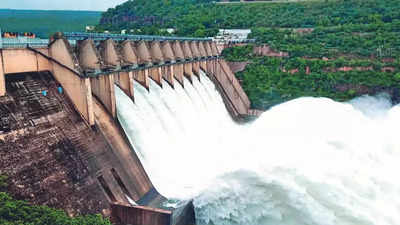The dispute over the Krishna River water share between Andhra Pradesh (AP) and Telangana has remained unsolved for nine years since the united state’s breakup.

So far, the resolution has been met
(1) Bachawat tribunal
- The Bachawat Tribunal (KWDT-I) was constituted in 1969 to settle the water-sharing issue between Maharashtra, Karnataka, and AP (before to bifurcation).
- The Tribunal granted AP 811 tmcft (thousand million cubic feet) of reliable water.
- Based on the command area formed by each region, the water was later shared in a 512:299 tmcft ratio between Andhra and Telangana.
- The Tribunal suggested moving water from the Tungabhadra Dam to Telangana’s drought-prone Mahabubnagar district, but this suggestion was not followed, causing dissatisfaction.
(2) Water-sharing arrangement after bifurcation
- The AP Reorganisation Act of 2014 made no mention of water shares because the KWDT-I Award was still in effect and did not specify region-specific allocations.
- During a conference organised by the Ministry of Water Resources in 2015, the two states agreed to an ad hoc agreement of sharing water in a 34:66 ratio (Telangana: Andhra).
- The agreement was intended to be reviewed once a year.
- The Krishna River Management Board (KRMB) and the Godavari River Management Board (GRMB) were established under the Act to manage water resources.
Each state’s claims
- Telangana claims that it is entitled to a minimum of 70% of the 811 tmcft allotment based on global practises and basin factors.
- Telangana emphasises how AP diverts approximately 300 tmcft of water from within the basin, harming Telangana’s drought-prone areas.
- AP also demands a larger portion of water to defend the interests of command regions that have already been developed.
The position of the centre
- The Centre organised two Apex Council sessions in 2016 and 2020, comprising the Union Minister and the Chief Ministers of Telangana and AP, but no significant progress was made.
- Telangana withdrew its case from the Supreme Court in 2020, on a request from the Ministry of Jal Shakti (MoJS), with the assurance that the subject will be transferred to a Tribunal.
- However, the Centre has taken no action on the problem in over two years, while the two states continue to have disagreements.
Way Forward
- Considering the prolonged dispute and the failure to reach a resolution, it is crucial for all stakeholders to take proactive steps. The following measures could be considered:
- Mediation: Appoint an independent organisation or mediator to support negotiations between the two states and aid in the discovery of a fair and mutually acceptable solution.
- Conduct a detailed scientific study of the basin parameters, water requirements, and the impact of present water utilisation practises to inform water share allocation.
- Raising public awareness about the necessity of water conservation, effective use, and sustainable practises in order to minimise total demand on water resources.
- Recommendations implementation: Implement the recommendations of earlier tribunals and committees to ensure equitable allocation of water resources and to address both governments’ grievances.
- More considerations: Encourage an atmosphere of cooperation and collaboration between AP and Telangana in order to cooperatively manage and utilise the Krishna River’s water resources for the benefit of both areas.
- To achieve a fair and just outcome for all parties involved, the central government must play an active role in facilitating discourse, providing essential support, and speeding the resolution process.
Source: https://jalshakti-dowr.gov.in/division/krishna-water-disputes-tribunal/#:~:text=The%20Central%20Government%20Vide%20Notification,(ISRWD)%20Act%2C%201956.
